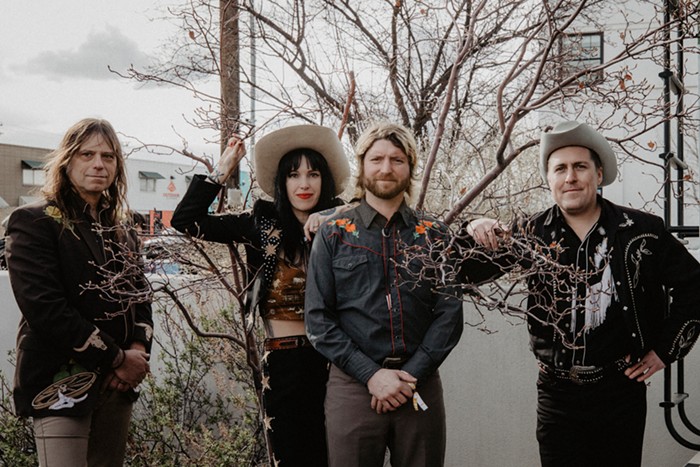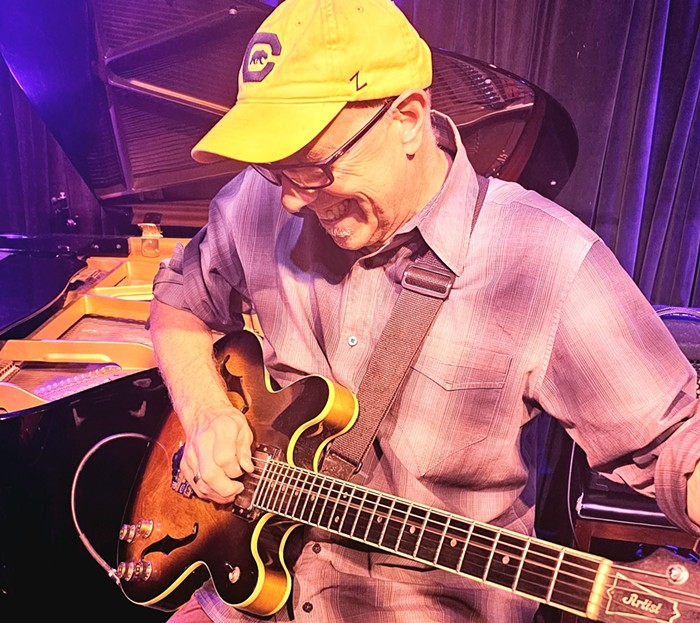When I told a friend that I was going to be interviewing Courtney Love's mother, she responded, "I didn't know she had—wait, yes, I guess I did know she had a mother." It's true, even Courtney Love has a mom, and her name is Linda Carroll. She is a therapist in Corvallis, and she's just written a memoir called Her Mother's Daughter.
Carroll grew up in an adopted, distant family in San Francisco. Her mother was well-meaning, but didn't understand Linda, while her father was a sexual predator. After high school, Linda was part of the burgeoning hippie scene in the Haight Ashbury, where she met an LSD enthusiast and Grateful Dead associate, Hank Harrison. Even as she began to realize how disturbed and manipulative Harrison was, Carroll became pregnant with Courtney, his daughter. After leaving Harrison, Carroll moved her family to New Zealand, where Courtney experienced a deeply difficult childhood. She was prone to rage and lies, convinced that everyone hated her, and so embarked on a streak of emotional destruction that eventually led to her leaving home as a teenager and becoming a punk vagabond stripper.
Her Mother's Daughter is not a scandalous tell-all. Carroll writes about her own story raising a troubled daughter, and the book ends with the death of Kurt Cobain. Carroll talked to us from her home in Corvallis about raising Courtney Love and the reasons she wrote this book now.
MERCURY: I've got to say, Linda—with all due respect—I'd be pretty upset if my mom wrote this book about me.
LINDA CARROLL: Well, your mother probably wouldn't write that book about you, just as I didn't write that book about my other kids. Courtney has chosen to be a public figure, and she's been out there, talking about everyone in her life, including her family, for over 20 years. With about three exceptions, everything I wrote about is something that Courtney has already talked about from her perspective. Also, I don't think that my book is against Courtney at all. I think it shows her as very human—both a talented and a tortured soul, but I think it's the soul of an artist and I hope that the book helps humanize her. I don't think it's a destructive book. Do you?
No, but there are a lot of issues I would've chosen to keep in the family, if it were me.
But it's not in the family anymore. It's all over every magazine, and she's been talking about it for 20 years. I don't mean this defensively, but I really hope I portrayed her from a very different, very human perspective.
Courtney called the book "greedy and vicious fiction."
This is what happened: The New York Post's Page Six [gossip column] took these one-liners from the book, put them all together, and wrote an article saying "Courtney's mother has written a tell-all," and that story went all around the world. Then Courtney's agent issued a statement based on what the Post said. Even I know that what comes out in those kinds of papers, especially on Page Six, is absolutely sensational. So for her agent to actually believe that this was the book, and to comment on it without even seeing it, was a real disservice to her.
There was a line in the book I thought may have been the most revealing aspect of Courtney's childhood personality. You write that she had a pattern of "making up stories about being singled out for persecution." What did you mean by that?
Courtney had a very big imagination. Her imagination was fabulous—she was always making up plays and stories. She had an amazing, creative, artistic energy. But I can remember saying "no" to her, and she'd hear it as, "I don't love you." If I would say, "You can't do something," she'd say, "You hate me." She had a hard time connecting with other kids. She wasn't like them, and she felt like they hated her. I didn't think they hated her, but I do think she felt persecuted by everyone—including me. It still goes on to this day. Her feeling is, "Why do people hate me?"
When Courtney was young she got shuffled around a lot, especially during her more difficult years. She was sent to stay with different friends and relatives, and to different schools and institutions. How hard was that for you, and do you think this has something to do with why she's so angry about her childhood?
Yes, I'm sure it did. It was horrible for me. I was so attached to her, and in a way that was different from my other kids. Now when I look back, I don't think it was healthy, and that I neglected my other kids for a lot of years because Courtney was the one who needed so much. It was the most terrible thing to feel that I couldn't help my child. That era was the worst of my whole life. I do think Courtney's childhood was horrible, but it wasn't because she wasn't loved or cared about. I think that inside her, it was really painful just to be alive, and nobody could help her.
The book ends in the mid '90s. The last time we see Courtney was right after Kurt's death. Why did you stop the narrative there?
The book had to end somewhere, and I think it's a book about mothers and daughters, so it ends with me finding my birthmother. After Kurt died, I didn't feel like I wanted to even speculate about Courtney's life.
Well, structurally, it ended well. It was the first time that Courtney asked for your help, and there seemed to be some peace and connection there.
That was only for a moment. Then the curtain came up and it was over.
So what's your relationship with Courtney now?
I'm not in touch—I haven't been in touch with her for a while. But I'm in touch with people around her, so I do know things about how she's doing and what's going on. We have some access to our granddaughter, but I think Courtney's putting all of her energy now into trying to get herself clean.
In the period since the book ended 12 years ago, we've seen the self-implosion of Courtney in the media, and now seems to be the most challenging time of her life. Why did you choose to write the book now?
The reason I wrote the book now, and the reason I haven't made any comment about Courtney in the media prior to this, is that I felt very reactive. I felt very distraught, and I didn't think I could trust anything I would say. I know that's not the place to write from. Now I don't feel reactive, and that more than ever, I wanted to have a documentation of my journey and family for my grandchildren, especially Frances. My hope is that this is something that will be helpful for her someday.
Kurt was the first person I had ever seen Courtney attach to. She wasn't attached to people in her family. She was needy, but not attached. But just because she wasn't attached doesn't mean we weren't attached to her. So I needed to find some way of being with the pain of that—not living without it, but learning to live with it. The pain of not knowing everyday when I pick up the paper if she was going to win an Academy Award or self-destruct.
Linda Carroll will read from Her Mother's DaughterThursday, Jan 19 at 7:30 pm at Powell's City of Books, 1005 W Burnside, free.
Our Favorite Courtney Love Moments (and Rumors We Choose to Believe) By Marjorie Skinner and Chas Bowie
• At the 1995 MTV Music Awards, as Kurt Loder attempts to interview Madonna, Courtney begins throwing compacts from her purse, continually interrupting the interview, until Madonna leaves the set. Courtney tries to sit down but falls out of her chair.
• After cursing out a stewardess and acting unruly on a Virgin Airlines flight in 2003, police inform Courtney she can't do that shit post-9/11—and detain her at the police station for nine hours.
• On the first day of Lollapalooza '95, Bikini Kill singer Kathleen Hanna (now of Le Tigre), reportedly asked Courtney "Where's baby [referring to Kurt Cobain]? In the closet with an IV?" Courtney punches Hanna in the face and showers her with Tootsie Rolls and Skittles. Taste the rainbow, Kathleen!
• After Courtney claims to lose her virginity with Julian Cope, singer of The Teardrop Explodes, he responds with a full-page ad in NME reading, "Free Us From Nancy Spungen-Fixated Heroin A-Holes Who Cling To Our Greatest Rock Groups And Suck Out Their Brains."
• Courtney later says that Michael Mooney, the guitar player for Julian Cope (and Spiritualized), popped her cherry. Here's how she remembers it: "After we'd done it I went across the road for cigarettes and I had all this blood and fluids running down my legs. Luuurgh, real graphic."
• When NME questions Courtney as to why everyone she claims to have slept with—from Julian Cope to Trent Reznor—denies it, she asks rhetorically, "Is it because I'm repulsive? Is it because I'm a widow?"
• At Kurt Cobain's post-suicide memorial service in Seattle, Courtney tells the grieving crowd, "He's such an asshole. I want you all to say 'asshole' really loud."
• At a 1995 Madison Square Garden Hole concert, Courtney attempts to get the audience to repeatedly chant the word "nigger."
• Doing her worst Drew Barrymore impersonation, Courtney flashes her titties six times at David Letterman in 2004.
• In 2003, Courtney gets in yet another fistfight, this time with Wendy O'Connor, Kurt Cobain's mother.
• Describing the time she OD'd on OxyContin in front of her daughter Frances Bean, Courtney recalls, "I made it fun. I said it was going to be gross and I was going to have to make myself throw up, but it was going to be okay." After Frances makes Courtney some green tea, Courtney is rushed to the hospital.


















